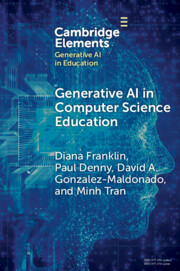Refine search
Actions for selected content:
2 results

Generative AI in Computer Science Education
- Challenges and Opportunities
-
- Published online:
- 05 April 2025
- Print publication:
- 24 April 2025
-
- Element
- Export citation
4 - Information Hazing
-
-
- Book:
- Governing Misinformation in Everyday Knowledge Commons
- Published online:
- 13 March 2025
- Print publication:
- 20 March 2025, pp 67-93
-
- Chapter
-
- You have access
- Open access
- HTML
- Export citation
